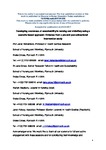Developing awareness of sustainability in nursing and midwifery using a scenario-based approach: Evidence from a pre and post educational intervention study
| dc.contributor.author | Richardson, Janet | |
| dc.contributor.author | Grose, J | |
| dc.contributor.author | Bradbury, M | |
| dc.contributor.author | Kelsey, Janet | |
| dc.date.accessioned | 2017-06-06T13:20:25Z | |
| dc.date.issued | 2017-06-01 | |
| dc.identifier.issn | 0260-6917 | |
| dc.identifier.issn | 1532-2793 | |
| dc.identifier.other | C | |
| dc.identifier.uri | http://hdl.handle.net/10026.1/9430 | |
| dc.description | publisher: Elsevier articletitle: Developing awareness of sustainability in nursing and midwifery using a scenario-based approach: Evidence from a pre and post educational intervention study journaltitle: Nurse Education Today articlelink: http://dx.doi.org/10.1016/j.nedt.2017.04.022 content_type: article copyright: © 2017 Published by Elsevier Ltd. | |
| dc.description.abstract |
BACKGROUND: The delivery of healthcare has an impact on the environment and contributes to climate change. As a consequence, the way in which nurses and midwives use and dispose of natural resources in clinical practice, and the subsequent impact on the environment, should be integral component of nursing and midwifery education. Opportunities need to be found to embed such issues into nursing curricula; thus bringing sustainability issues 'closer to home' and making them more relevant for clinical practice. OBJECTIVES: The study was designed to measure the impact of a sustainability-focussed, scenario-based learning educational intervention on the attitudes and knowledge of student nurses and midwives. DESIGN: Pre test/Post test intervention study using scenario-based learning as the educational intervention. The Sustainability Attitudes in Nursing Survey (SANS_2) was used as the outcome measure. SETTINGS: Clinical skills session in a UK University School of Nursing and Midwifery. PARTICIPANTS: 676 second year undergraduate nursing and midwifery students. METHODS: The 7-point scale SANS survey was completed before and after the teaching session; standard non-parametric analysis compared pre and post intervention scores. RESULTS: Changes were observed in attitude towards climate change and sustainability and to the inclusion of these topics within the nursing curricula (p=0.000). Participants demonstrated greater knowledge of natural resource use and the cost of waste disposal following the session (p=0.000). Participants also reported that sessions were realistic, and levels of agreement with statements supporting the value of the session and the interactive nature of delivery were higher following the session. CONCLUSIONS: Using a scenario-based learning approach with nursing and midwifery students can change attitudes and knowledge towards sustainability and climate change. Embedding this approach in the context of clinical skills provides a novel and engaging approach that is both educationally sound and clinically relevant. | |
| dc.format.extent | 51-55 | |
| dc.format.medium | Print-Electronic | |
| dc.language | en | |
| dc.language.iso | en | |
| dc.publisher | Elsevier BV | |
| dc.subject | Nurse education | |
| dc.subject | Climate change | |
| dc.subject | Resources | |
| dc.subject | Sustainability | |
| dc.subject | Scenario-based learning | |
| dc.subject | Clinical skills | |
| dc.title | Developing awareness of sustainability in nursing and midwifery using a scenario-based approach: Evidence from a pre and post educational intervention study | |
| dc.type | journal-article | |
| dc.type | Journal Article | |
| plymouth.author-url | https://www.webofscience.com/api/gateway?GWVersion=2&SrcApp=PARTNER_APP&SrcAuth=LinksAMR&KeyUT=WOS:000404505000007&DestLinkType=FullRecord&DestApp=ALL_WOS&UsrCustomerID=11bb513d99f797142bcfeffcc58ea008 | |
| plymouth.volume | 54 | |
| plymouth.publication-status | Accepted | |
| plymouth.journal | Nurse Education Today | |
| dc.identifier.doi | 10.1016/j.nedt.2017.04.022 | |
| plymouth.organisational-group | /Plymouth | |
| plymouth.organisational-group | /Plymouth/Faculty of Arts, Humanities and Business | |
| plymouth.organisational-group | /Plymouth/Faculty of Arts, Humanities and Business/School of Society and Culture | |
| plymouth.organisational-group | /Plymouth/Faculty of Health | |
| plymouth.organisational-group | /Plymouth/Faculty of Health/School of Nursing and Midwifery | |
| plymouth.organisational-group | /Plymouth/Research Groups | |
| plymouth.organisational-group | /Plymouth/Research Groups/Institute of Health and Community | |
| plymouth.organisational-group | /Plymouth/Users by role | |
| plymouth.organisational-group | /Plymouth/Users by role/Academics | |
| dc.publisher.place | Scotland | |
| dcterms.dateAccepted | 2017-04-24 | |
| dc.rights.embargodate | 2018-4-29 | |
| dc.identifier.eissn | 1532-2793 | |
| dc.rights.embargoperiod | Not known | |
| rioxxterms.versionofrecord | 10.1016/j.nedt.2017.04.022 | |
| rioxxterms.licenseref.uri | http://www.rioxx.net/licenses/all-rights-reserved | |
| rioxxterms.licenseref.startdate | 2017-06-01 | |
| rioxxterms.type | Journal Article/Review |


